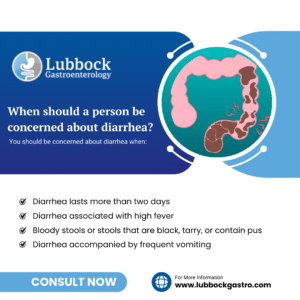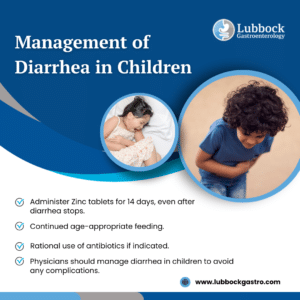Diarrhea Management in Lubbock, TX
Outlined below are the principles involved in the management of diarrhea.
Assessment of Dehydration and Rehydration Therapy
The first principle of managing diabetes includes the assessment of the patient’s dehydration and rehydration status. Hydration status can be classified as severe dehydration, mild dehydration, or no dehydration, and each level has its appropriate treatment.
In the case of severe dehydration, intravenous fluid, Ringer lactate/ diarrhea treatment solution (DTS), or normal saline can be used to address severe dehydration.
Mild Dehydration is treated using reduced osmolarity ORS. For patients with no dehydration, ORT can be used to prevent dehydration.
Antibiotic if indicated
Antibiotics are indicated for diarrhea caused by bacteria and parasites. However, if a virus causes diarrhea, antibiotics will not help.
Zinc supplementation
Zinc reduces the duration and severity of diarrhea, so it’s administered when managing diarrhea. It’s used in managing diarrhea in adults and children.
Use anti-diarrheal medications with caution.
Sometimes, antidiarrheal medications like loperamide may relieve your symptoms. However, speak to your doctor before using these medications to avoid complications.
When should a person be concerned about diarrhea?

When should a person be concerned about diarrhea
You should be concerned about diarrhea when:
- Diarrhea lasts more than two days
- Diarrhea associated with high fever
- Bloody stools or stools that are black, tarry, or contain pus
- Diarrhea accompanied by frequent vomiting
Severe diarrhea is associated with signs of dehydration, such as excessive thirst, dry mouth or skin, little or no urination, severe weakness, dizziness or lightheadedness, or dark-colored urine.
Infants, toddlers, and young children should be taken to the doctor if they have diarrhea or any dehydration symptoms lasting more than 24 hours.
Immunocompromised adults should also visit a physician when they’ve diarrhea.
Different Types of Diarrhea
Osmotic Diarrhea
Osmotic water absorption in the intestines depends on the proper absorption of solutes, and it’s prevented if there are too many solutes in the intestinal lumen, which leads to diarrhea. Osmotic diarrhea is a type of diarrhea that results from the ingestion of a poorly absorbed substrate or malabsorption.
Secretory diarrhea
Usually, a large amount of water is secreted into the small intestine lumen, but a significant portion gets absorbed before reaching the large intestine. Secretory diarrhea is seen when water secreted is far greater than absorption in the intestine.
Cholera caused by Vibrio cholerae produces toxins responsible for excess water secretion in the intestine, which causes diarrhea.
Apart from cholera, other agents that cause secretory diarrhea include tumors, tumor-secreting hormones, certain laxatives, hormones, organic toxins, and metals.
Inflammatory diarrhea
It’s also known as infectious diarrhea. The gastrointestinal tract has an epithelium that is protected by a barrier. This barrier can be damaged by microbial and viral pathogens, resulting in diarrhea.
Some of the pathogens that attack the epithelium and send inflammatory mediators that damage the site include bacteria like Salmonella, E. Coli, and Campylobacter, Viruses like Rotaviruses, coronaviruses, parvoviruses, Protozoa like Coccidia species, Cryptosporidium, and Giardia.
Motility-related diarrhea
Another type of diarrhea is motility-related diarrhea. Nutrients and water are efficiently absorbed if exposed to the intestinal epithelium and remain in the intestine for a specific transit time. Any factor that causes an increase in transit time can result in diarrhea.
Management of Diarrhea in Children
The principles in the management of diarrhea in children include:
- Rehydration of children with ORS solution. Rehydration should be stopped, and diarrhea should be stopped.
- Administer Zinc tablets for 14 days, even after diarrhea stops.
- Continued age-appropriate feeding.
- Rational use of antibiotics if indicated.
- Physicians should manage diarrhea in children to avoid any complications.
Dietary Management of Diarrhea

Management of Diarrhea in Children
The recommended diet for diarrhea management includes the following:
- Drinking 8-10 cups of fluid per day, like water, broth, or electrolyte replacement drinks.
- Eat frequent small portions slowly during the day.
- Consider low soluble fiber to help firm up stool.
- Limit fried or fatty foods that make diarrhea worse.
- Foods with lots of sugar, such as regular pop, candy, large quantities of juice, and chocolate milk, can worsen diarrhea.
Nutritional Management of Acute Diarrhea
One can manage acute diarrhea using nutrition and diet.
Below are foods you should eat if you’re experiencing diarrhea:
- Yogurt, egg, and cottage cheese
- Rice, noodles, and potatoes
- White bread
- Canned, peeled fruits, and well-cooked vegetables
- Skinned chicken or turkey, lean beef, and broiled or baked fish.
Avoid consuming
- Fatty or fried foods
- Raw vegetables
- Fruit seeds, skins, and stringy fibers if you have diarrhea.
How to Manage Diarrhea Without Any Medications?
Avoid Trigger Foods
Certain foods and fluids may soften your stool or increase your bowel movements and must be avoided. These include:
- Proteins, such as steak, pork, and salmon
- Certain vegetables, such as broccoli, cauliflower, and carrots
- Gluten, eggs, and dairy products
- Very hot or cold drinks
- Processed, fatty, and spicy foods
- Alcohol and coffee.
Consider a Bland and Low-fiber Diet
Foods such as rice, saltine crackers, toast, bananas, apple sauce, clear broth, and potatoes may effectively relieve the symptoms of diarrhea because these foods are bland, starchy, and low in fiber.
Drink Plenty of Fluids
Replacing lost fluids is essential to treating diarrhea. Drink plenty of water to manage diarrhea and avoid being dehydrated.
How Should the Patient with Chronic Diarrhea Be Approached?
A patient with chronic diarrhea should be approached similarly to a patient presenting with a medical condition many may see as more serious. A detailed medical history should be taken to identify the cause or precipitating factors.
After that, a physical examination is essential for patients with chronic diarrhea, followed by necessary tests and treatment.
Diarrhea Home Remedies
Water
Dehydration is a dangerous effect of diarrhea in children and older adults, so it is crucial to drink enough water if you have diarrhea. Drinking sufficient water is the first step to keep you hydrated.
Experts also recommend drinking diluted fruit juice, OTC rehydration solutions, such as Pedialyte, or sports drinks, such as Gatorade. Avoid drinking liquids such as alcohol and hot and fizzy drinks that will further irritate the digestive tract.
Turmeric
A pinch of turmeric in warm water may help combat diarrhea. Turmeric has a lot of health benefits. It has antiseptic and anti-inflammatory properties. It should be used in moderation to avoid worsening diarrhea.
Cinnamon
Cinnamon is also an effective home remedy for diarrheal. Have a pinch of cinnamon mixed with lemon juice and warm water.
Dietary changes
Dietary changes such as incorporating semisolid and low-fiber foods such as crackers, toast, eggs, rice, or chicken can help. Foods such as dairy products, fatty foods, high-fiber foods or highly seasoned foods should be avoided for a few days if you’re experiencing diarrhea.
Prevention Strategies
Below are strategies that can help to prevent diarrhea:
Wash Your Hands Frequently
One of the most essential strategies to prevent diarrhea is to wash your hands properly and frequently. It’s the safest and the easiest way to prevent the spread of diarrhea-causing organisms from person to person and throughout an entire community.
Eat safe food and drink safe water.
In addition to washing your hands, ensure you take safe foods and drinks. Boil and cook your food well before eating. Eat your food hot and always keep food covered. Check to ensure your water is safe for drinking. Drink bottled water, particularly when you travel to new places.
Always use safe and pure water to wash and prepare your food, make your ice, and brush your teeth. If you do not have bottled water, boil or disinfect available water to make it safe.
Vaccinate Your Child
All babies are to be vaccinated against rotavirus, which causes severe diarrhea in babies and young children. The virus can lead to vomiting, fever, and dehydration. Vaccination can help prevent these viral infections.
FAQ
What is the first-line treatment for diarrhea?
The first line of treatment for diarrhea is Oral rehydration solution (ORS). It’s a specific mixture of glucose and sodium available in over-the-counter commercial preparations.
How can I relieve discomfort caused by diarrhea?
You can quickly relieve any discomfort caused by diarrhea by rehydrating yourself and eating a recovery diet such as bland foods and anti-diarrheal medications.
Will IV fluids help with diarrhea?
Yes, IV fluids can help with diarrhea. It helps to hydrate you and restores nutrients that your body loses through diarrhea.
What is an oral rehydration solution?
Oral rehydration solution is a fluid replacement used to prevent and treat dehydration caused by diarrhea.
Why Is It Important to Distinguish Between Acute and Chronic Diarrhea?
Acute diarrhea is the sudden onset of three or more loose or watery stools daily, lasting 14 days or less. On the other hand, chronic diarrhea is the type that persists for more than 14 days.
It’s essential to distinguish between these two because they usually have different causes, diagnoses, and treatments.
Why is zinc used to treat diarrhea?
Zinc is used to treat diarrhea because research has shown that when it’s administered, it helps to reduce the duration and severity of diarrhea and prevent recurring episodes of diarrhea.
Dr. Islam’s Diarrhea Treatment in Lubbock, TX

Dr. Islam’s Diarrhea Treatment in Lubbock, TX
Diarrhea may be seen as a minor condition, but it can become concerning when it doesn’t resolve on time and is accompanied by severe symptoms.
If you have diarrhea, you need to visit a reputable gastroenterologist for proper diagnosis and treatment. We recommend that you visit Dr. Sameer Islam in Lubbock, TX, for proper diagnosis and treatment for diarrhea.
Dr. Islam is a renowned gastroenterologist with many years of experience providing successful treatments to patients with digestive health issues like diarrhea.
Contact Dr. Islam today or book an appointment to get a proper diagnosis and treatment.
